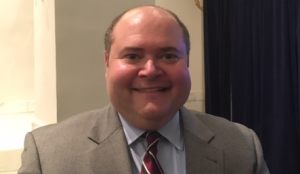The Latest And Greatest In President Trump's Judicial Nominations (Part 2)
President Trump just announced his tenth wave of judicial nominees -- who are they?

‘This is a YUGE reshaping of the federal judiciary.’ (by Isaac Brekken/Getty)
Last week, I posted a roundup of the status of judicial nominations, for both circuit and district courts, for circuits up through and including the Fifth Circuit. Today I turn my attention to the Sixth through Eleventh Circuits.
But after my earlier roundup, some news happened: this past Tuesday, President Donald Trump announced his tenth wave of judicial nominees, twelve nominees in all. There’s one circuit-court nominee among them — John Nalbandian, whom I’ll discuss below in my section on the Sixth Circuit — plus eight district-court nominees and three nominees for non-Article III courts (the Court of Appeals for Veterans Claims, the Tax Court, and the Court of Federal Claims).

Ranking The Law Firms Lawyers Love
Professor Carl Tobias of the University of Richmond, a leading expert on the federal judiciary, shared these overall insights on the new nominees with me:
The nine nominees posted on Tuesday were interesting. I was pleased to see that five were for emergency vacancies in Texas and Louisiana, both of which have many, so I am hoping the White House will prioritize emergencies as there are 72 now. I also noticed that Red states are still taking precedence, as the vacancies continue piling up in Blue states like California, New York, and New Jersey. I hope the White House does start paying attention to the district vacancies and those in blue states. After all, 120 is a huge number, and district judges are the “workhorses” of the federal bench.
I concur. But as we’ll see below, blue states remain on the back burner when it comes to judicial nominations, for reasons mainly having to do with politics.
As for specific names among the new nominees, I’ll discuss them in their circuit-specific sections below. But six of the new district-court nominees require me to double back to the Fifth Circuit: Alan Albright (W.D. Tex.), a partner in the Austin office of Bracewell LLP and former U.S. magistrate judge; J. Campbell Barker (E.D. Tex.), Deputy Solicitor General in the Texas Attorney General’s Office; Jeremy Kernodle (E.D. Tex.), a partner in the Dallas office of Haynes and Boone; Robert Summerhays (W.D. La.), a U.S. bankruptcy judge in his district; Michael Truncale (E.D. Tex.), a partner at Orgain Bell & Tucker; and Wendy Vitter (E.D. La.), general counsel of the Roman Catholic Church of the Archdiocese of New Orleans.
Sponsored

Luxury, Lies, And A $10 Million Embezzlement

Law Firm Business Development Is More Than Relationship Building

Curbing Client And Talent Loss With Productivity Tech

Curbing Client And Talent Loss With Productivity Tech
Having reviewed the (quite impressive) backgrounds of these nominees, which collectively include Biglaw practice, judicial experience, and other government service, I don’t see any major potential problems. Remember that they hail from Texas and Louisiana, two states with all-Republican delegations in the Senate.
Campbell Barker and Wendy Vitter struck me as the most interesting. Barker, a 2005 graduate of UT Law, is a bit on the young side — which is how the Trump Administration likes ’em — but he does have the twelve years of experience that the American Bar Association (ABA) seeks in judicial nominees. Barker also boasts an otherwise great résumé: two federal appellate clerkships; private practice at the elite boutique of Yetter Coleman, where he made partner; and federal and state government service, at Main Justice and in the office of Texas Attorney General Ken Paxton (who released an effusive statement of praise for Barker).
As for Wendy Vitter of Louisiana…. as in, that Vitter, from Louisiana? Yes, Wendy is (still) married to David Vitter, the former U.S. senator (R-La.) who got outed as a client of D.C. Madam back in 2007. Wendy Vitter has senatorial support and solid credentials — Tulane Law, service as chief of the felony trials division in the Orleans Parish District Attorney’s Office, experience prosecuting homicides — and I expect her to be easily confirmed.
So if David Vitter ever strays again, then Judge Vitter can hold him in contempt of court — or worse! As Wendy Vitter quipped back in 2000 — when President Bill Clinton’s infidelity was in the news, but before her husband’s misdeeds came to light — “I’m a lot more like Lorena Bobbitt than Hillary. If he does something like that, I’m walking away with one thing, and it’s not alimony.”
Now let’s dive into the Sixth through Eleventh Circuits. As always, if you have any comments, corrections, or additional information, please email me (subject line: “Judicial Nominations”). As you read this roundup, keep these useful links on hand for ready reference:
Sponsored

Ranking The Law Firms Lawyers Love

Thomson Reuters' Claims Explorer: A Powerful Tool For Legal Claim Identification

- Judicial Confirmations for the 115th Congress [U.S. Courts]
- Current Judicial Vacancies [U.S. Courts]
- Future Judicial Vacancies [U.S. Courts]
- Ratings of Judicial Nominees for the 115th Congress [American Bar Association]
Sixth Circuit

John B. Nalbandian (by Taft Stettinius & Hollister)
After the confirmations of Judges John Bush, Joan Larsen, and Amul Thapar, there are two vacancies on the Sixth Circuit: the Ohio-based seat of Judge Alice Batchelder, and the Kentucky-based seat of Judge John M. Rogers. In addition, I predict that President Trump will get another Sixth Circuit opening to fill in the next year or so when Judge Deborah L. Cook takes senior status, which she’ll be eligible for as of this May.
The Sixth Circuit nominee announced on Tuesday, John Nalbandian, is a partner in the Cincinnati office of Taft Stettinius & Hollister. Although he practices in Ohio, Nalbandian has been nominated for Judge Rogers’s seat in Kentucky. But as noted by Zoe Tillman of Buzzfeed, Nalbandian lives in Kentucky, has longtime involvement in Kentucky Republican politics, and enjoys the support of Senate Majority Leader Mitch McConnell (R-Ky.). Nalbandian is admitted to practice in both Ohio and Kentucky and a member of both the Ohio and Kentucky State Bar Associations.
Nalbandian’s confirmation will be smooth. The U. Penn. and UVA Law graduate is a leading appellate lawyer who would also bring more diversity to the Sixth Circuit. As noted by the National Asian Pacific American Bar Association (NAPABA), which supports his nomination, he would be just the second Asian Pacific American to serve on the U.S. Court of Appeals for the Sixth Circuit, as well as the seventh active Asian Pacific American federal appellate judge in the nation.
Nalbandian previously won Senate confirmation — back in 2010, i.e., during the Obama Administration — on a voice vote. Although President Obama’s nomination of Nalbandian to the Board of Directors of the State Justice Institute was made on the recommendation of Senator McConnell, the Obama Administration’s acquiescence and the lack of opposition to Nalbandian on the Senate floor suggest that he will win broad support yet again.
What about the Ohio-based seat of Judge Alice Batchelder? Judge Batchelder leaves big shoes to fill. Appointed by President Ronald Reagan to the Northern District of Ohio in 1985 and elevated by President George H.W. Bush to the Sixth Circuit in 1991, Judge Batchelder has been a leading conservative voice on a rather polarized court for more than a quarter century — so the standards for this seat are high.
My prediction for the vacancy: Robert Alt, president and CEO of The Buckeye Institute, a free-market-focused think tank based in Columbus. Alt, an ex-Batchelder clerk himself (and said to enjoy the support of his former boss), has won praise from Ken Blackwell, writing in the pages of Breitbart, and Quin Hillyer, writing in pages of the National Review. It’s impressive when both pro- and anti-Trump conservatives/libertarians can actually agree on something.
Alt already had his White House Counsel interview, in which he reportedly excelled. His selection is by no means a done deal; there are several other candidates on the short list. But if the Trump Administration wants nominees who are “not weak,” then Alt is a strong pick. Unlike some of the other potential nominees, who come from private or government practice and have shorter paper trails, Alt has a longstanding and public commitment to textualism and the rule of law, which he has worked to advance while serving in the non-profit trenches. (I reached out to Alt for comment but did not hear back from him.)
As for the district courts within the Sixth Circuit, there are a total of ten current and future vacancies, as follows: the Eastern District of Kentucky (2), the Western District of Kentucky (1), the Eastern District of Michigan (1), the Western District of Michigan (1), the Northern District of Ohio (1), the Southern District of Ohio (2), the Middle District of Tennessee (1), and the Western District of Tennessee (1).
For the seat that the Eastern District of Kentucky shares with the Western District, the nominee is Claria Horn Boom, a partner in the Lexington office of Frost Brown Todd LLC. For the other Eastern District seat, the nominee is Robert E. Wier, a magistrate judge in the district. For the Western District seat, the nominee is Rebecca Grady Jennings, chair of the litigation practice group at Middleton Reutlinger.
All three have excellent backgrounds and will almost surely be confirmed. The toughest sell might be Jennings, simply by virtue of her youth (she’s around 40) — but as noted by the Vetting Room, a great resource for folks tracking judicial nominations, Jennings would be the first woman exclusively appointed to the Western District, and she is “unlikely to draw significant opposition due to her mainstream background.”
Turning to the Tennessee seats, the nominees are Eli Richardson (M.D. Tenn.), a partner at Bass Berry & Sims, and Mark Saalfield Norris Sr. (W.D. Tenn.), Majority Leader in the Tennessee State Senate. Eli Richardson has a wealth of experience — including service as an FBI agent as well as a federal prosecutor — and he can expect smooth sailing. Senator Norris could have a tougher path, as explained by the Vetting Room:
There is generally good reason why state legislators are not directly appointed to the federal bench. As legislating is inherently political, legislators invariably have a long record of controversial actions that can be mined for opposition. Unfortunately for him, Norris does as well. Norris’s strong conservative record in the Tennessee Senate and his rhetoric on same-sex marriage and refugee resettlement will certainly be used by opponents to paint him as a bigot.
But I agree with the Vetting Room’s bottom line:
However, Norris benefits from his thirty-seven-year long practice history. He can argue that his representation of personal injury plaintiffs as well as defendants shows a willingness to understand both sides of the law. Furthermore, Norris benefits from his strong endorsement from Alexander and Sen. Bob Corker (R-TN).
With Republicans in the majority, Norris remains the odds-on favorite for confirmation.
If controversial blogger John Bush can make it on to the Sixth Circuit, then so can Senator Norris.
Seventh Circuit

Michael Brennan (by Gass Weber Mullins)
After the confirmation of Judge Amy Coney Barrett, the Seventh Circuit has three openings: the Illinois-based seats of Judges Richard Posner and Ann Claire Williams, and the Wisconsin-based seat of Judge Terence Evans. Only the Wisconsin seat has a nominee, former judge Michael Brennan, now a partner at Gass Weber Mullins.
As I’ve explained before, there’s controversy over the Wisconsin seat, the oldest circuit-level vacancy in the entire federal judiciary. As Professor Tobias previously noted, “The Wisconsin Seventh Circuit seat was one where Donald Schott, a highly qualified, mainstream nominee, did not receive a final vote in 2016″ (even after his nomination was reported out of the Senate Judiciary Committee by a vote of 13-7). So, perhaps on a “turnabout is fair play” theory, Democratic Senator Tammy Baldwin has not returned a blue slip for Brennan.
Still, if I had to bet, I’d wager that Brennan will (eventually) be confirmed. Despite the missing blue slip from Senator Baldwin, Senate Judiciary Chairman Chuck Grassley (R-Iowa) held a hearing for Brennan anyway. It took place this past Wednesday, and according to Professor Tobias, Brennan “did very well. He was very articulate and engaged in a way other nominees haven’t.”
But as noted by the Vetting Room, which also predicts that Brennan will ultimately be confirmed, “given the opposition of his home state senator and the Republicans’ narrow margin of error, the outcome is not set in stone.” For example, imagine that Brennan doesn’t get a floor vote and the Senate then changes hands this fall. Brennan could suffer the same fate as Donald Schott, who got voted out of the Judiciary Committee but never got a floor vote. So Senator McConnell and the Republicans should prioritize a floor vote on Brennan, even over other nominees for longstanding vacancies, before the seat slips away.
As for the two Illinois vacancies, I’ve floated names before for them. I identified Skadden partner Michael Scudder as the most likely pick, and word on the street is that he will soon be announced. (I don’t know about the second seat; given the status of Illinois as a blue state with two Democratic senators, it could take some time.)
Turning to the district courts, there are eight current and future vacancies. Three are in the powerhouse court of the Northern District of Illinois (aka Chicago), two are in the Northern District of Indiana, two are in the Southern District of Indiana, and one is in the Eastern District of Wisconsin.
There are two nominees: James R. Sweeney II (S.D. Ind.), a partner in the Indianapolis office of Barnes & Thornburg, and Gordon P. Giampietro (E.D. Wis.), an in-house lawyer at Northwestern Mutual Life Insurance Company. Neither is controversial, and both will be confirmed.
Sweeney, a Naval Academy and Notre Dame Law School graduate, is a combat veteran, retired Marine Corps colonel, and former law clerk to two federal judges. He is now a highly regarded litigator who handles intellectual property, defense, and technology-related cases.
Giampietro is a former federal prosecutor and former partner at Michael Best & Friedrich who started his legal career by clerking for Judge Rudolph T. Randa — whose seat he would fill if confirmed. And Giampietro almost certainly will be confirmed, considering that he came out of the joint nominating commission of Senator Baldwin and Senator Ron Johnson (R-Wis.) — the commission that didn’t approve Judge Brennan for the Seventh Circuit, which Senator Baldwin cites as a reason for withholding her support.
Eighth Circuit

Justice David Stras (by David Lat)
In the wake of the confirmations of Judges Ralph Erickson and Steve Grasz, by votes of 95-1 and 50-48 — Grasz garnered controversy after receiving a “not qualified” rating from the ABA, which conservatives blamed on bias — there is a single vacancy on the court. And it will soon be filled.
Justice David Stras, a superbly qualified and very popular member of the Minnesota Supreme Court, was nominated last May to fill the seat of Judge Diana E. Murphy, and he was re-nominated earlier this month. Stras’s qualifications were never in question, but Senator Al Franken (D-Minn.) refused to return his blue slip basically because he found Stras, a former law clerk to Justice Clarence Thomas, too conservative. But now that Senator Franken is out of the picture, Senator Amy Klobuchar (D-Minn.) is on board, and Justice Stras’s nomination got voted out of committee by a 13-8 vote, he will win confirmation fairly soon.
There are seven district-court vacancies in the Eighth Circuit — in the Eastern District of Arkansas (1), the Northern District of Iowa (1), the District of Minnesota (2), the Eastern District of Missouri (1), the District of Nebraska (1), and the District of North Dakota (1) — but no nominees yet.
(Flip to the next page to read about the remaining circuits.)







